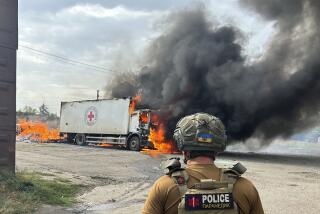Red Cross Murder Case: Grave Wound for Chechnya
- Share via
Chechnya in the aftermath of its bitter 21-month war for independence from Russia is a ravaged and lawless land. Warlords and bandit gangs ruthlessly contend for power in the vacuum left by the withdrawal of most Russian troops and the absence of effective local authority. Out of this anarchic brew has come a new atrocity notable for its viciousness. In the early morning hours of Tuesday, six foreigners working for the International Committee of the Red Cross were murdered in their beds at a hospital compound in the village of Novye Atagi. It was the worst attack on workers in the humanitarian agency’s 133-year history, and it has now led to the virtual shutdown of all relief operations in Chechnya.
The identity of the assassins is unknown and their motivations can only be guessed at. Speculation focuses on a plot to disrupt the local elections scheduled for late next month. In Moscow, a deputy interior minister says Russian police are hard at work investigating the murders. But with Russia’s official presence in Chechnya now all but ended, that inquiry does not look very promising.
There will be other victims of these killings. The Red Cross has suspended operations in Chechnya. So has the French relief group Doctors Without Borders. The war in Chechnya destroyed much of its infrastructure, leaving tens of thousands without basic services. Foreign relief workers have been vitally important in partially meeting the medical needs produced by the war and the breakdown in health care. With their departure under the threat of further terrorism, the needs of many Chechens will go unmet.
The six murdered Red Cross workers, five women and one man, came from Norway, the Netherlands, Canada, Spain and New Zealand. A seventh worker, a Swiss man, was badly wounded. Like all International Red Cross workers and many others who enroll in similar relief organizations, they knew there were hardships and risks in carrying out humanitarian missions in dangerous places. They were among the best of those who offer their skills and their caring to serve humanity.
More to Read
Sign up for Essential California
The most important California stories and recommendations in your inbox every morning.
You may occasionally receive promotional content from the Los Angeles Times.










